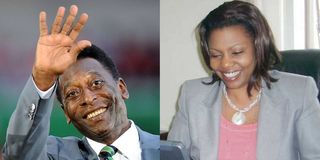Ode to the legendary duo of Pele, Kasavuli

The late legendary Brazilian footballer Pele and news anchor Catherine Kasavuli.
“I have had a stroke,” a friend told me as we greeted each other over the December holidays. It was devastating. He was a haunting spectre: His face and mouth looked a little twisted after the stroke.
With scruffy eyebrows, his eyes were hollow, swarmed by foreboding echoes, shadows and grief — like a doomed fish. He looked small as if a sudden gust of wind would flip him over.
He is in his thirties and the emotional man that I am, my first impulse was to sob tears of a happy reunion and a mourned, irrecoverable time when he was in perfect health. As he shuffled away awkwardly after the goodbyes, limping as an unsettling reminder of the disease, my heart broke.
I was taken aback by the fragility of the present made more mysterious by the forbidding lottery logic. The randomness with which one is handed this or that fate is a subject of much consternation. One gets a stroke in his 30s. Another shocking medical diagnosis.
Yet another spends days in a hospital ward with that nameless but unmistakable smell of hospitals. The dull curtains, the sad sounds, the gurgling through plastic tubing, the dripping from the IV line, the alarms and nurses’ feet hurriedly hitting the floor. Another person’s fate could be the sudden death of a loved one that ushers in a lush cover of darkness.
Good health
There are some things we expect when growing up. We almost take it for granted that we'll be healthy. Success, prosperity and good health always seem near; a possibility, even a promise. During the days of great promise, one thinks the end of those days will never come. However, they do end. And the end, when it comes, can be swift and brutal.
I thought about the fickleness of life, especially in light of my sick friend and the deaths of two legends (Catherine Kasavuli and Pelé). I was like Joan Didion when she wrote, in Blue Nights, “I found my mind turning increasingly to illness, to the end of the promise, the dwindling of the days, the inevitability of the fading, the dying of the brightness”.
Though both Catherine Kasavuli and Pelé have now crossed to the land of no return, we can learn a lot from their lives. As a public figure and media personality, Kasavuli taught us the importance of doing our work excellently — with much elegance and a smile — that it mattered how we showed up to work.
Pelé (born Edson Arantes do Nascimento) has been described by Brazilian writer José Wisnik as “the most consummate, luminous figure of perfection to ever grace a soccer field… No one else combined his speed and dribbling skills, the ability to shoot with both feet, his precise and devastating ground and aerial play, a magical sense of timing with the ball...”.
The nickname Pelé is synonymous with football, like a parable or an oracle for greatness. He zeroed in on football with a singular kind of shrill fury and made his mark. This encourages us that we can also do the same — in our different fields, far away from the football one.
Both Kasavuli and Pelé exhibited mastery in what they did, although in different ways; Kasavuli mostly at the Kenyan national stage and Pelé at the global stage. According to Mastery, a book by Robert Greene, the first step to mastery is discovering one’s calling (life task).
He contends that “You possess an inner force that seeks to guide you towards your life’s task — what you are meant to accomplish in the time that you have to live”. Kasavuli’s life task was to be a news anchor gracing our TV screens. Pelé was to entertain us by playing football. However, they didn’t stop at just discovering their calling. They worked hard towards the mastery of the skills needed.
Greene writes that the next step is to submit to the reality of apprenticeship. He advises us that “learn the lessons and follow the path established by the greatest masters, past and present.” This is the stage in which one learns the necessary skills to discipline one’s mind and transform oneself into an independent thinker who solves complex problems in their field of expertise.
For Kasavuli, this must have involved mastering proper diction, so her words were as clear as a bell when she read the news. For Pelé, this is the stage in which he most likely learnt dribbling and the skills required to score goals.
Another step Greene writes about, among other steps, is to “awaken the dimensional mind”. He writes that, “As you accumulate more skills… internalise the rules that govern your field”. This inspires us to know how things work in our areas of calling.
This is especially important for young people. Instead of spending all their time on social media amusing themselves day and night, they can pick a skill and master it. For the rest of us, as we make new year resolutions, we should remember that learning and mastery come through engaging in activities that challenge us and move us out of our comfort zones. We must stretch to learn new skills. And since it starts in our minds, may we have a year of magical thinking.





